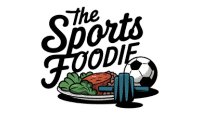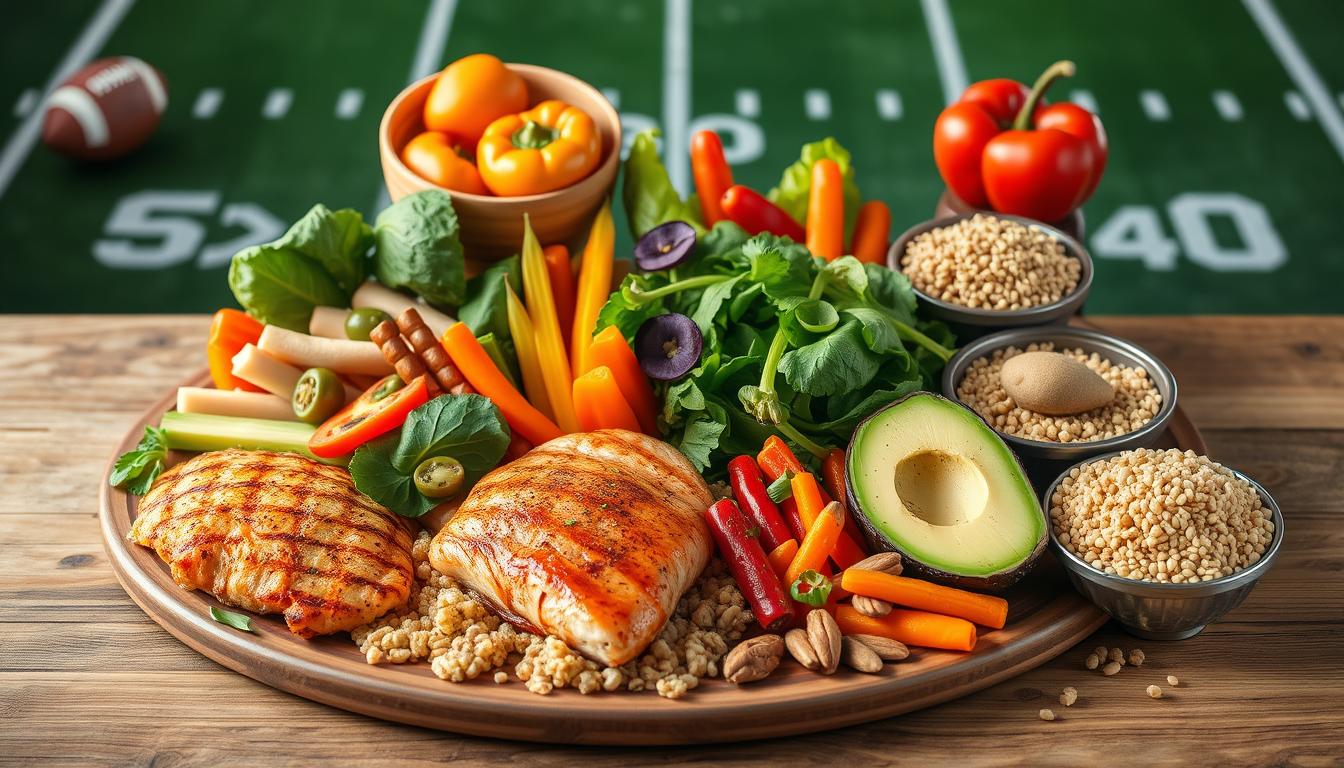As an NFL player, you know off-season training is key. A good football player diet is essential. It helps you reach your fitness goals and boosts your game.
With the right nutrition plan, you can improve your performance. You’ll come back stronger than ever.
Now, let’s dive into some important tips for fueling your body. You’ll learn how to eat, train, and recover like a pro. We’ll focus on simple, effective NFL nutrition strategies that fit your life.
The Importance of Off-Season Nutrition for NFL Athletes
As an NFL athlete, you understand that your body is your temple. What you eat greatly affects your performance. In the off-season, it’s key to focus on nutrition to fuel your body for recovery and peak performance. A good nutrition plan helps keep your strength, speed, and agility up. It also aids in recovery and lowers injury risk.
Nutrition plans for NFL players must be customized based on several factors. These include weight, height, body fat percentage, and playing position. For instance, offensive linemen need a different diet than wide receivers. Carbohydrates are vital for NFL players, who rely on glycogen stores for energy. They should eat whole grain bread, pasta, rice, potatoes, fruits, and vegetables for nutrients.

- Lean protein sources such as chicken, turkey, lean red meats, beans, dairy, eggs, and fish
- Complex carbohydrates like whole grains, fruits, and vegetables
- Healthy fats such as nuts, seeds, avocados, and olive oil
By focusing on these nutrients and tailoring their nutrition plan, NFL players can enhance their performance. They also support their recovery techniques.
Calorie Adjustments for Off-Season Training
As a football player, adjusting your calorie intake is key during the off-season. Your needs depend on your position, weight, height, and training goals. For instance, linemen might eat 4,000 to 6,000 calories a day. Quarterbacks, on the other hand, need about 3,000 to 3,500 calories.
To find your ideal calorie intake, think about how much energy you burn during training. Use a calorie calculator or talk to a sports dietitian to figure out your daily needs. It’s also vital to eat a balanced diet that fuels your body.

Here are some general guidelines for calorie intake during off-season training:
- Average daily calorie intake for linemen: 4,000-6,000 calories
- Average daily calorie intake for quarterbacks: 3,000-3,500 calories
- Focus on balanced meals with protein, complex carbohydrates, and healthy fats
Proper calorie intake is essential for off-season training and recovery. Eating the right amount of calories helps you perform better and reach your goals. Talk to a sports dietitian or healthcare professional to find the best calorie plan for you.
| Position | Average Daily Calorie Intake |
|---|---|
| Linemen | 4,000-6,000 calories |
| Quarterbacks | 3,000-3,500 calories |
Essential Macronutrients for NFL Players Off-Season Nutrition
As an NFL player, it’s key to eat the right mix of macronutrients. This supports your training and recovery. A balanced diet with protein, carbs, and healthy fats is vital for top performance. In the off-season, focus on these to keep your strength and health up.
Protein Requirements and Sources
Protein is vital for NFL players to build and repair muscles. Aim for 1.6-2.2 grams of protein per kilogram of body weight each day. Eat it in 3-5 meals. Good protein sources are lean meats, fish, eggs, dairy, and plant-based foods like beans and tofu.
Carbohydrate Management
Carbs give you energy for workouts and refill glycogen stores. Choose complex carbs like whole grains, fruits, and veggies. They’re full of fiber, vitamins, and minerals. Try to get 50-55% of your calories from carbs.
Healthy Fat Integration
Healthy fats are key for energy, hormone balance, and vitamin absorption. Add nuts, seeds, avocados, and olive oil to your meals. Aim for 15-20% of your calories from healthy fats.
Here’s a daily macronutrient guide for NFL players:
| Macronutrient | Daily Intake |
|---|---|
| Carbohydrates | 50-55% of daily calories |
| Protein | 25-30% of daily calories |
| Healthy Fats | 15-20% of daily calories |
Hydration Strategies During Training Breaks
As a football player, staying hydrated is key, even during breaks. Drinking enough water helps prevent dehydration and keeps you performing well. Try to drink at least one standard bottle of water an hour or two before practice or games.
It’s important to watch your urine color and how often you go. If your urine is dark yellow or you’re not going to the bathroom enough, you might not be drinking enough. Here are some tips to stay hydrated:
- Drink 16-20 ounces of fluid every hour during practice or games
- Eat foods with lots of water, like fruits and vegetables
- Stay away from sugary drinks and caffeine, as they can dry you out
Also, make sure to replace lost electrolytes during long, intense activities. You can use sports drinks, electrolyte powders, or salty snacks. By following these tips, you can keep your performance up and avoid dehydration and cramps.
Remember, staying hydrated is a big part of being a good football player. It’s vital to focus on it during training breaks. By drinking enough water, you can perform at your best and lower the chance of getting hurt.
| Fluid Intake | Frequency |
|---|---|
| 16-20 ounces | Every hour during practice or games |
| 1-3 liters | Daily, adjusted depending on individual needs |
Supplement Planning for Performance Maintenance
As an NFL athlete, you know a balanced diet is key. But supplements also help with training and recovery. It’s important to pick the right ones to keep your performance up.
Core supplements for NFL athletes include protein powders, BCAAs, and omega-3s. They aid in muscle recovery, reduce inflammation, and boost health. For example, protein powders are vital for muscle growth and repair.
Timing and dosage are critical. Take a protein shake within 30 minutes after working out for muscle recovery. Also, talk to a healthcare pro or dietitian to find the best supplements for you.
Here are some key considerations for supplement planning:
- Choose high-quality supplements from reputable manufacturers
- Follow the recommended dosage and timing guidelines
- Consult with a healthcare professional or registered dietitian to determine the best supplements for your needs
By adding the right supplements to your routine, you can keep your performance high. This helps you reach your goals as an NFL athlete.
Meal Timing and Frequency Adjustments
As a football player, adjusting your meal timing and frequency is key. It helps fuel your body for top performance. It’s important to eat the right foods at the right times to meet your energy needs.
Eat a balanced meal with protein, carbs, and fats 1-3 hours before training. This gives you energy and supports muscles. After training, have a snack or meal with carbs and protein to help recover.
Here are some tips for adjusting your meal timing and frequency:
- Eat 4-6 meals a day, every 2-3 hours, to keep energy stable.
- Include protein in each meal to help muscles repair and grow.
- Drink lots of water all day to stay hydrated.
By adjusting your meal timing and frequency, you can improve your nutrition and performance. Listen to your body and adjust your meal plan as needed. With the right nutrition, you can reach your training goals.
Recovery Nutrition Protocols
As an athlete, you know how vital recovery nutrition is. After a hard workout, your body needs the right food to fix and grow muscle. A good recovery nutrition plan helps you recover from tough sessions and get ready to perform at your best.
So, what’s in a recovery nutrition plan? It begins with eating the right foods after working out. You should mix carbs and protein to refill energy and fix muscles. Also, getting enough sleep is key to fully recover and adapt to the challenges you face. Eating foods that fight inflammation can also help with muscle soreness and overall health.
- Post-workout nutrition: aim for a mix of carbohydrates and protein within 30-60 minutes after exercise
- Sleep support: aim for 7-9 hours of sleep per night to allow your body to fully recover
- Anti-inflammatory foods: include foods rich in omega-3 fatty acids, antioxidants, and other anti-inflammatory compounds in your diet
By adding these elements to your recovery plan, you can recover quicker, perform better, and lower injury risk. Always drink plenty of water, listen to your body, and tweak your plan as needed for the best results.
| Component | Recommendation |
|---|---|
| Post-workout nutrition | Carbohydrates and protein within 30-60 minutes after exercise |
| Sleep support | 7-9 hours of sleep per night |
| Anti-inflammatory foods | Foods rich in omega-3 fatty acids, antioxidants, and other anti-inflammatory compounds |
Building a Sustainable Meal Plan
As a football player, having a good meal plan is key. It should meet your nutritional needs and help with training and recovery. A well-thought-out meal plan can boost your performance, lower injury risk, and improve your health.
To create a sustainable meal plan, focus on whole foods. These include vegetables, whole grains, and lean proteins. Healthy fats like nuts and seeds, and complex carbs like whole wheat pasta and brown rice are also good. Remember to drink plenty of water all day.
Here are some tips for building a sustainable meal plan:
- Plan your meals in advance to ensure you’re getting the nutrients you need
- Shop for groceries regularly to keep healthy foods on hand
- Prepare healthy meals at home using fresh ingredients
- Avoid relying on fast food or processed snacks
A sustainable meal plan is vital for football players. It supports their training and recovery. By eating whole, unprocessed foods and staying hydrated, you can perform better and avoid injuries. With some planning and prep, you can create a meal plan that’s good for you and supports your health.
Common Nutrition Mistakes to Avoid
As an athlete, it’s key to eat the right foods for top performance and recovery. But, many athletes make mistakes that slow them down. One big error is over-restrictive eating, which can cause nutrient gaps and lower performance.
Another mistake is relying too much on supplements instead of real food. Supplements are helpful, but they shouldn’t replace a balanced diet. Also, eating too soon before or too late after a workout can hurt your performance and recovery.
Over-Restriction Pitfalls
Too little food can harm your muscles, strength, and recovery. Athletes who eat too little might feel tired, dizzy, and have trouble focusing.
Supplement Overreliance
While supplements are good, relying too much on them can upset your diet balance and performance. Focus on eating whole foods first, and use supplements to fill any gaps.
Poor Timing Choices
Eating too close to or too far from a workout can mess up your performance and recovery. Try to eat a balanced meal with protein, carbs, and fats 1-3 hours before a workout. And eat within 30-60 minutes after to help your body recover.
Avoiding these common mistakes can help athletes perform better and recover faster. It’s important to eat whole foods, balance your diet, and time your meals right to reach your goals.
| Nutrition Mistake | Effect on Performance | Effect on Recovery |
|---|---|---|
| Over-restriction | Decreased strength and endurance | Impaired recovery and increased risk of injury |
| Supplement overreliance | Decreased performance due to imbalanced diet | Impaired recovery due to lack of essential nutrients |
| Poor timing choices | Decreased performance due to inadequate fueling | Impaired recovery due to delayed or inadequate nutrition |
Conclusion: Maintaining Athletic Excellence Through Proper Nutrition
To be an NFL player, you need a diet that supports your training and recovery. This article has given you tips to fuel your body for top performance. It also helps you avoid injuries and reach your goals.
Proper nutrition is key to being the best athlete. With the right advice, you can improve your game. Eat well, drink plenty of water, and use supplements wisely. This way, your body will be ready for success on the field.


